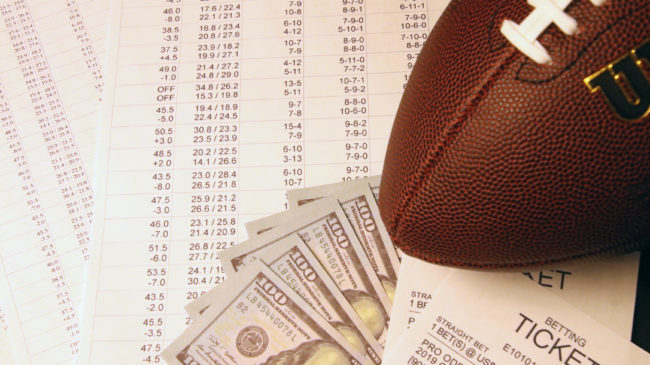South Dakota Constitutional Amendment B: Deadwood Sports Betting Legalization
Summary:
South Dakota’s Constitutional Amendment B would amend the state constitution to allow the legislature to legalize sports betting within the city of Deadwood. Sports betting would also be available at all Indian casinos in the state, as in accordance with federal law any activity allowed in a commercial casino is allowed in Indian casinos. Gaming tax revenues from sports betting in Deadwood would be apportioned according to state law.
Fiscal Impact:
Fiscal analysis conducted by the South Dakota Legislative Research Council shows potential revenue of more than $2 million for the Deadwood casino sector and nearly $185,000 in taxes.
Proponents’ Argument For:
Supporters of Amendment B argue that the legalization of sports betting will generate more revenue for the gaming sector and tax revenue for South Dakota. They say sports betting is already taking place but is confined to the illegal market, depriving governments of income, and exposing consumers to fraud and abuse. In 2019, 14 percent of adults in South Dakota said they planned to bet on the NFL that season, despite it being illegal. Two of South Dakota’s neighbors, Montana and Iowa, already allow sports betting. With sports betting illegal in South Dakota, casinos across the border in Iowa have an advantage over native gaming institutions.
Iowa has raised $1.9 million in tax revenue since sports betting was legalized in August 2019. A host of gaming options are already available in the city of Deadwood, including poker, roulette, slots, and blackjack. There’s no logical reason to exclude sports betting, which is popular and increases fan engagement, supporters say. South Dakotans, supporters argue, would enjoy a better experience and be better protected from abuse, fraud, and predatory practices in a regulated, legal environment.
Opponents’ Argument Against:
Opponents claim that any expansion of the legal gaming sector will only promote the problem of gambling addiction. They say that making sports more accessible and acceptable will increase the opportunities for problem gamblers to lose vast sums of money. According to a 2019 study conducted by WalletHub, South Dakota is the second most gambling-addicted state in the nation, with Nevada being the first. Those critical of legalization claim the revenue subsequently generated will be significantly reduced by the costs of administering the new regime and the social costs resulting from gambling addiction. Gambling addiction can lead to financial ruin, crime, and health problems, which can impose burdens on the general taxpayer, opponents say. Critics of legal sports betting also claim that increasing the size of the betting market also opens the possibility of corruption and game-fixing.
Discussion:
Black markets are always a danger to consumers, and gambling is no exception to this rule. Sports bettors in South Dakota suffer a worse experience and increased risk of fraud thanks to the illegality of sports betting. Legalizing sports betting would benefit both consumers and the state as a whole, with benefits to the state including, higher tax revenue, elimination of illegal sportsbooks, and increased appeal of gaming facilities to tourists.
According to South Dakota slaw, 40 percent of gaming tax revenue is currently directed to the state Tourism Promotion Fund and 10 percent goes to Lawrence County. Some portion is given to the administration of the South Dakota Gaming Commission and a further $100,000 is given to the Historical Preservation Loan and Grant Fund. Of what remains, up to $6.8 million is given to the Deadwood Historic Restoration and Preservation Fund, after which the remaining portion is divided between the state general fund, Lawrence County municipalities, Lawrence County school districts, and the state Historic Preservation Fund.
Eighteen states and the District of Colombia have legalized some form of sports betting, and four more states have passed bills to do so. Fears about increases in the rate of problem gambling are not in concert with the facts. Rates of problem gambling hold relatively stable regardless of the legal regime. The United Kingdom, for example, has one of the least regulated gambling markets in the world but a lower problem gambling rate than China, which prohibits all gambling.
Last year’s WalletHub study claiming South Dakota is the country’s second most gambling-addicted state also demonstrates the point. Of the 20 metrics the study used to calculate the overall score of a state’s addictiveness, 12 are based on the state’s “friendliness” to gambling—meaning its regulatory regime—with the remaining eight measuring problem gambling and treatment. When examining the measure of problem gambling rather than the state’s legal system, we find South Dakota drops from second to sixth place. In this scenario, Hawaii has the second-worst gambling problem in the country despite all gaming being illegal, while Nevada ranks 11th with all gambling being legal.
Corruption is one of the main reasons why states were prohibited from legalizing sports betting in 1992. But the Supreme Court struck down the Professional and Amateur Sports Protection Act (PASPA) in 2018 because it violated the anti-commandeering doctrine. Thankfully, there’s no evidence that legal sports betting increases the prevalence of corruption domestically or internationally. In fact, with a legal market, law enforcement can work effectively with game operators to monitor and address suspicious betting patterns.
Legalization of sports betting would likely bring more significant benefits in the form of fan engagement. According to a survey by Nielson Sports, on average, NFL bettors watched 19 more football games in the 2016 season than those who didn’t bet. The study also found that 84 percent of respondents were more likely to watch a game if they had bet on it, and 77 percent said that placing a bet on a game made it more fun and enjoyable to watch.
Resources should be available for a small portion of people who suffer from gambling addiction. However, prohibition does nothing to help gambling addicts, while imposing costs on the broader public.
Voters Guides to Other Consumer Freedom 2020 Ballot Initiatives
Voters’ Guides to 2020 Ballot Initiatives on Other Policy Topics

